Home » Mental Resilience » Why you should meditate: 16 research-backed benefits that can transform your life
Why you should meditate: 16 research-backed benefits that can transform your life.
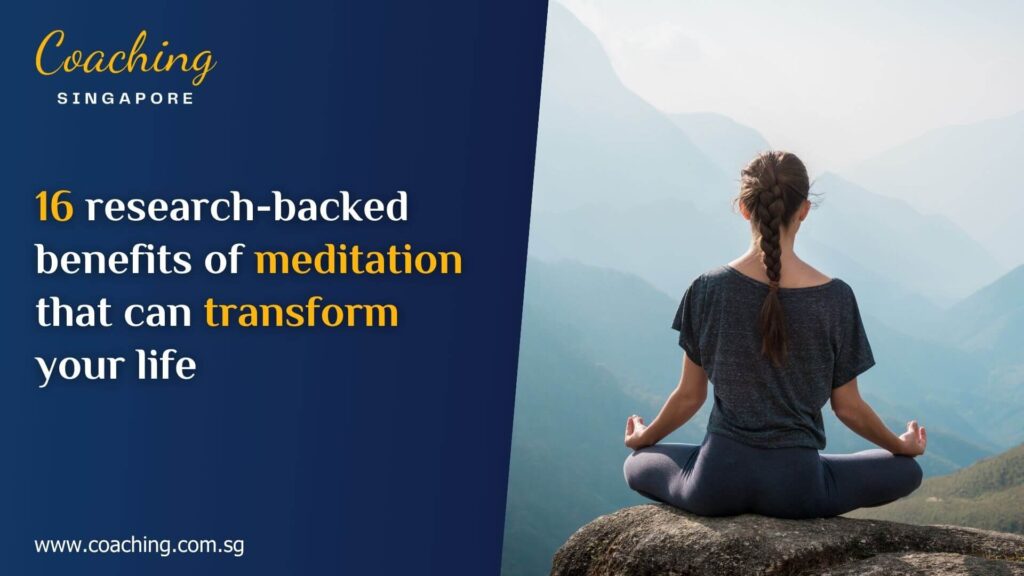
- Author: Coach Sam
In today’s busy world, we are often juggling multiple tasks and our thoughts can be misaligned with the immediate task at hand.
From daybreak till the time we hit the bed, many of us are in a near-constant state of accomplishing one thing to the next.
If we are lucky, this accomplishment happens in a state of harmony within us – we are well-aligned to our goals and how we achieve them.
For most of us, when we encounter obstacles or need to struggle to get something done, we ‘force’ ourselves to push ahead despite the discomfort.
This discomfort can accumulate within us, building a level of frustration and leaving us in an “unoptimized” state.
We may have used our willpower to bottle up our emotions, keep a straight face, and be diplomatic.
And by the end of the day, we just want to release it all, let our hair down, and let go.
We keep ourselves going by downing coffee in the day, and wine after sundown.
In moderation, both coffee or wine is fine.
But there is a practice far more powerful in sustainably rebalancing us.
It is a habit that cleanses our minds and hearts of unnecessary thoughts and unresourceful emotions.
What is Meditation?
Meditation is about training the mind to become more aware of yourself and getting a healthy sense of perspective.
You are not trying to brush away your thoughts or feelings.
Instead, you are learning to observe them without judgment.
Learning to meditate is like learning any other skill.
Think of it like exercising a muscle that you’ve never really worked on before.
It takes consistent practice to get comfortable in it.
And it’s usually easier if you have a teacher.
A simple way to meditate is to sit quietly in a cool and comfortable place.
It is ideal to be clean, not hungry, thirsty, or too full, wearing comfortable clothes, and feeling as unencumbered as we can.
For this, many meditators choose a consistent time and location for their sessions.
After gently closing your eyes, simply become aware of your breath.
As we do so, we are also regularly checking on the sensation in our bodies.
This does not mean we react to any of them.
We try to remain still and equanimous for as much time as we can, simply observing.
This is because we know that any sensation that has arisen will also dissipate.
Meditation offers many benefits.
The following are covered in this article:
- Creates harmony
- Improves memory
- Enhances focus
- Balances emotions
- Makes us more creative
- Makes us better problem-solvers
- Untangles our thoughts
- Increases immunity
- Reduces stress
- Reveals what’s important
- Gives us courage
- Regulates heart rate
- Gives us a feeling of wellbeing
- Boosts our energy levels
- Helps us avoid troubles
- Makes us more likable
All the above tips are actionable nuggets that you can apply right after reading this blog.
So without wasting any of your time, let’s get to it!
#1 - Creates harmony
We all want smoothness and stability in our bodies, mind, work, and relationships.
Some types of meditation may particularly increase positive feelings and actions toward yourself and others.
Metta, a type of meditation also known as loving-kindness meditation, begins with developing kind thoughts and feelings toward yourself.
Through practice, people learn to extend this kindness and forgiveness externally – first to friends, then acquaintances, and ultimately enemies.
By doing so, one can experience internal and external harmony.
#2 - Improves memory
Meditation has been scientifically proven to increase focus and memory.
Source: https://www.ncbi.nlm.nih.gov/pmc/articles/PMC3541490/
Many forms of meditation, such as mindfulness or compassion or breath-aware meditation, teaches us to concentrate our mind.
When you’re able to focus better, you’re also better able to solidify concepts in your short-term memory.
Therefore, practicing meditation can help you to exercise your memory muscles to remarkable levels.
Many little but valuable memories come to the fore.
We start to remember details that had slipped away from our conscious minds.
#3 - Enhances focus
Focused attention meditation is like weight lifting for your attention span.
It helps increase the strength and endurance of your attention.
For example, a study found that people who listened to guided meditation audio experienced improved attention and accuracy while completing a task, compared with those in a control group.
A similar study showed that people who regularly practiced meditation performed better on a visual task and had a greater attention span than those without any meditation experience.
Moreover, another study concluded that meditation may even reverse patterns in the brain that contribute to mind-wandering, worrying, and poor attention.
Meditating even for a short period each day may benefit you.
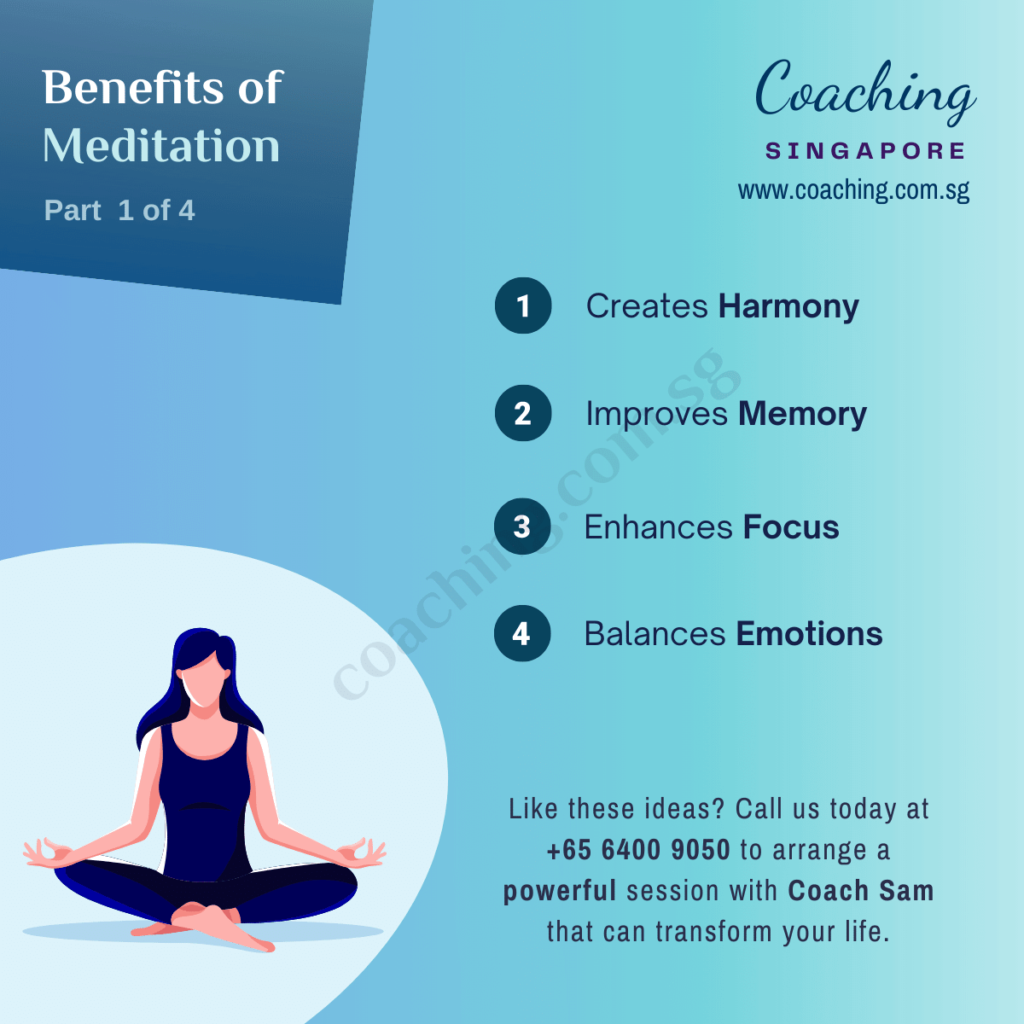
#4 - Balances emotions
Meditation helps you develop a stronger understanding of yourself, helping you grow into your best self.
For example, self-inquiry meditation explicitly aims to help you develop a greater understanding of yourself and how you relate to those around you.
Other forms of meditation teach you to recognize thoughts that may be harmful or self-defeating.
The idea is that as you gain greater awareness of your thought habits, you can steer them toward more constructive patterns and manage your emotions.
#5 - Makes us more creative
We all need ideas to get us through a modern workday successfully.
Ideas include ways to be more effective and impressive.
When we meditate, our mind is able to perceive what lies ahead of us more clearly.
The parts of the brain usually too consumed by urgent distractions take a step back.
This frees up precious mental resources.
Thus, it is only natural that some of our best ideas arise before us.
This is a similar effect that some of the greatest minds like Archimedes and Newton experienced when they were unwinding themselves in a bath and under a tree respectively.
#6 - Makes us better problem-solvers
Our creativity, enhanced by meditation, can also give us much better abilities at troubleshooting and fixing things.
This is because we can often retain some of our meditativeness even after we have finished sitting still, gently observing on our breath.
As we go through our day, our minds are much more able to “separate the wheat from the chaff”.
We are able to reflect back on many of our past experiences in life and come up with ideas to try that are likely the possible answers to our situation.
We are also able to much more clearly visualize in our minds, the steps we are going to take, and the effects they may have.
These are precisely the qualities needed in someone who can resolve the issues and move on to success.
#7 - Untangles our thoughts
Self-inquiry and related styles of meditation can help you “know yourself.”
This can be a starting point for making other positive changes.
You are able to observe your thoughts as they appear in your awareness.
That enables you to untangle your thoughts and think clearly about the solutions to your problems.
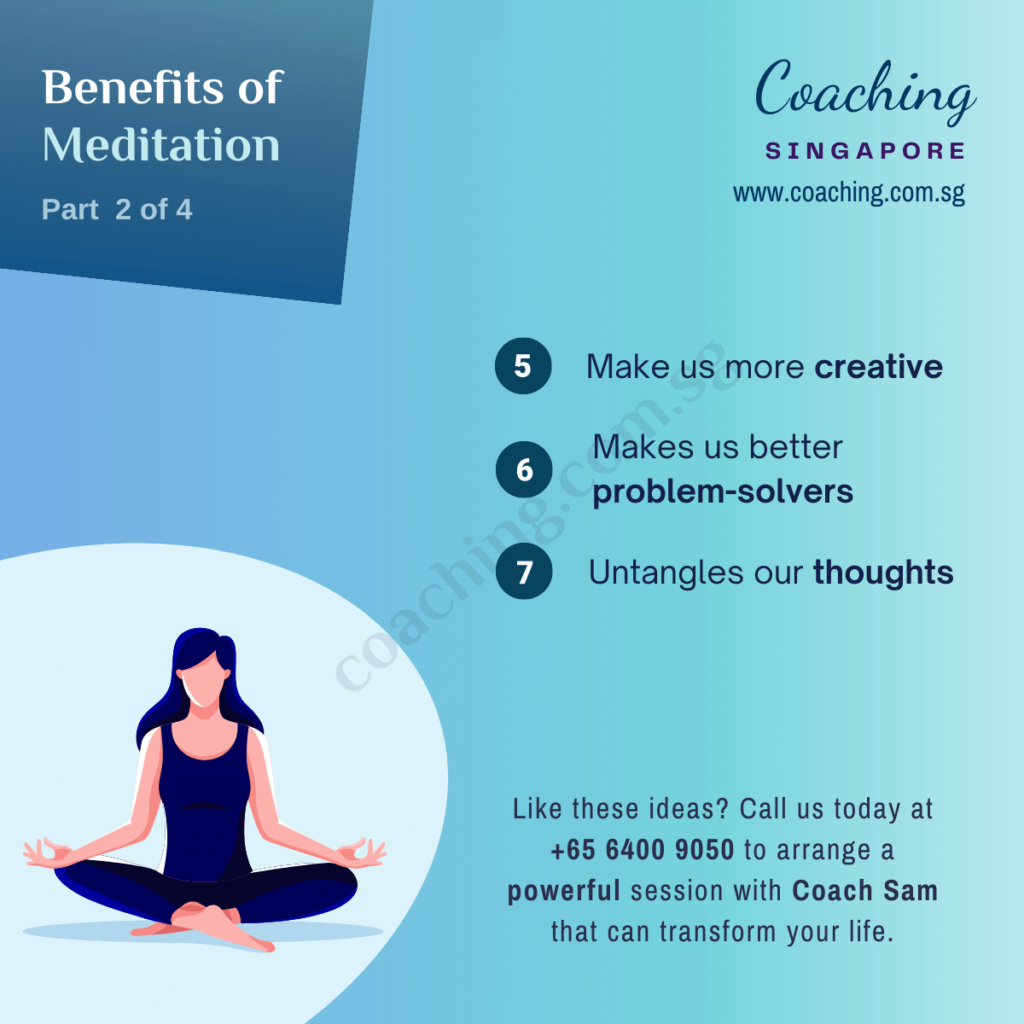
#8 - Increases immunity
Meditation improves physical health by reducing strain on the heart and it can also boost your overall immunity.
We tend to breathe better and get more attuned to our bio-feedback i.e. listening to our bodies.
It also does wonders for our hormone levels – reducing the stress hormones like cortisol, glucagon, prolactin, and adrenaline, and balancing out the healthy happiness hormones like endorphins, serotonin, dopamine, and oxytocin.
Source: https://www.ncbi.nlm.nih.gov/pmc/articles/PMC2695992/
#9 - Reduces stress
Meditation can produce a deep state of relaxation and a tranquil mind.
This process may result in enhanced physical and emotional well-being.
Because we are sitting quietly and still, as long as we are not forcing ourselves to do so, most of our bodily functions – heart rate, breathing, and circulation gently fall into a relaxed pace.
And because we are practicing the art of letting go, with the knowledge of how everything simply comes and goes, some beautiful new thoughts and ideas arise within us.
We become less attached to the little things and hence less distressed.
#10 - Reveals what’s important
During deep sessions of meditations, the thoughts that cause fear, anxieties, or any recent concern that has been causing you to worry will reveal themselves to you irrespective of whether you are running from it or not.
They will reveal what is important to you at that moment and what needs to be taken care of.
It declutters the mind from all the other irrelevant stuff.
#11 - Gives us courage
“Fortune favors the brave” as the saying goes.
We need guts to achieve glory.
Meditation can help us build our dormant fortitude and inner strength.
After practicing meditation for some months, we see quite a significant change in perception, observation, and expression.
This is because we finally get some time and peace to visualize our days ahead.
We are able to explore and investigate possibilities of how we might face situations that bother us and still come out on top.
This is at the very heart of overcoming phobias i.e. irrational fears also.
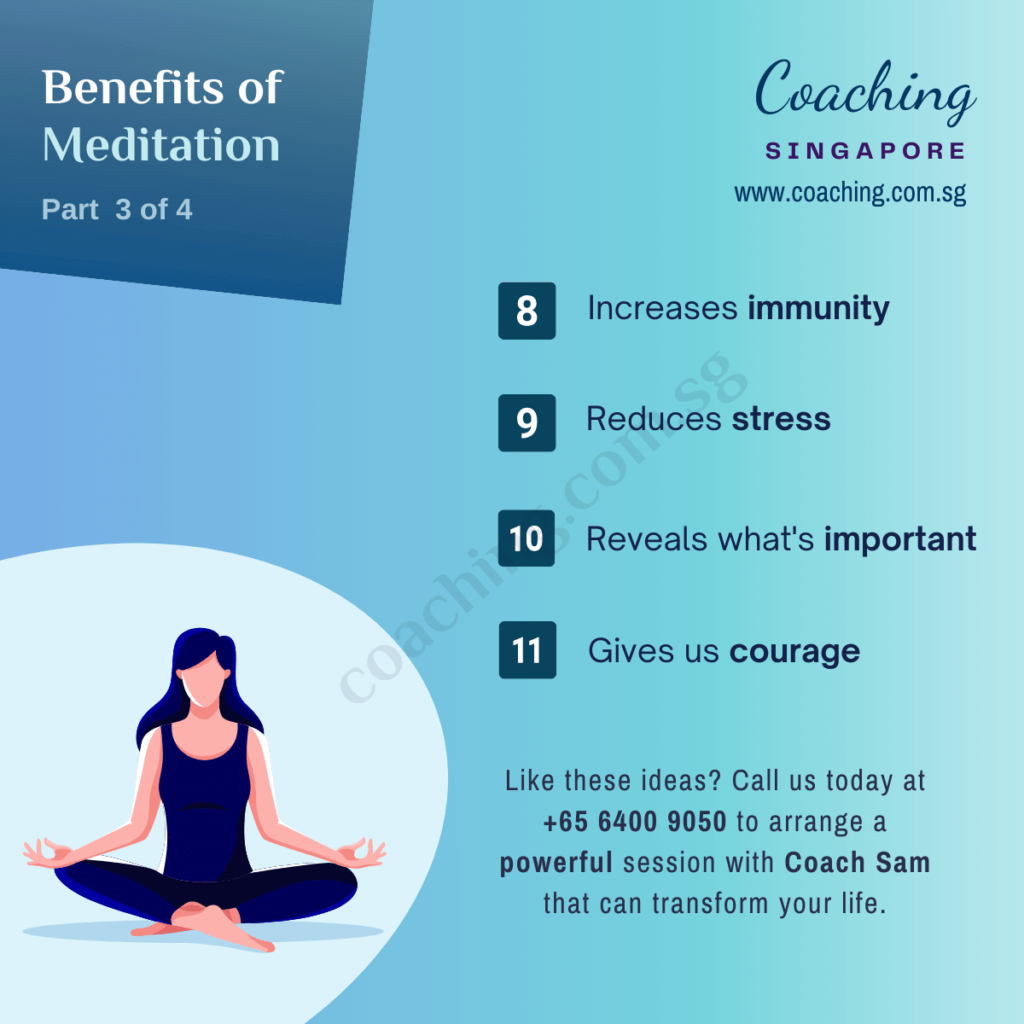
#12 - Regulates heart rate
Meditation activates our bodies’ “rest-and-digest” functions, which counteracts our “flight-or-fight” responses.
Integrating the practice into a daily routine has been linked to lower heart rate and blood pressure, which may lower your risk of heart disease.
Source: https://www.health.harvard.edu/heart-health/meditation-offers-significant-heart-benefits
#13 - Gives us a feeling of wellbeing
As we go deeper and calmer in our meditation, the levels of feel-good hormones in our bodies, such as dopamine, oxytocin, endorphins, and serotonin, rise.
As we learn to become more equanimous to both the future and the past, to pleasure and to pain, we feel bliss.
Thus we are less attached or averse to whatever comes our way.
We start to become masters of our state, and hence our destiny.
Various studies also indicate that it may increase your capacity for happiness, joy and reduce your propensity towards negativity.
Source: https://www.studyfinds.org/happiness-learning-meditation/
#14 - Boosts our energy levels
Throughout the day, we want to function at our optimum best.
Meditation relaxes our body, life energy, mind, and intellect so that these vital energies can be stored up to be used later.
It’s like closing the tap and filling the tank. So after meditation, our tank is full.
But in order to feel energetic, the stored energy has to readily flow into different faculties of our consciousness.
#15 - Helps us avoid troubles
As we meditate, and the important values of our life become clearer, we become less inclined to do stupidly risky things.
Being calmer and yet more alert, we tend neither to overreact nor under-respond to events.
We end up making better decisions, moment to moment, thereby putting ourselves in the path of good fortune.
This effectively means, we get smarter and wiser.
Source: https://eocinstitute.org/meditation/increase-your-intelligence-with-meditation/
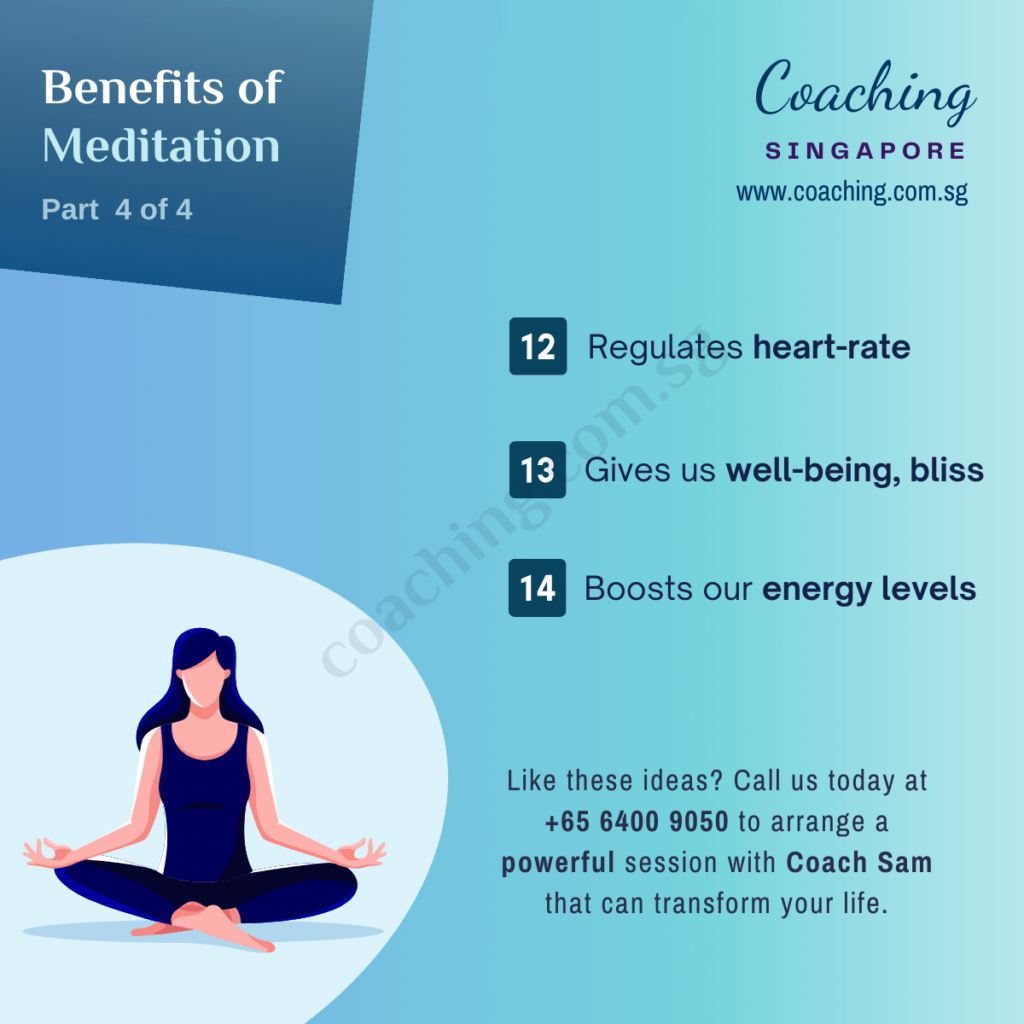
#16 - Makes us more likable
The effects of practicing meditation last well beyond the time we are visibly practicing it.
As we become better meditators, we find ourselves in a much more robustly philosophical state.
This calm yet light state of making us instantly more approachable and attractive.
We become better listeners, open to new ideas, curious, and more empathetic, and thus much better conversationalists.
There is an “air” of comfort around us that has those around us simply feeling good.
The result: a lot more friends and associates who like us enough to do mutually beneficial things.
Conclusion:
As discussed above, there are many benefits to meditation with almost no downsides.
From our health and well-being to our resilience and output, we simply become better versions of ourselves as meditators.
Note: Meditation is not right for everyone all the time.
Do not force yourself to do it.
Please check with your qualified mental health professional before starting.
Comment: Is there any other benefit that you have gained by practicing meditation? Also, what is the meditation practice that you do?
Please do let me know in the comment section below, I would love to learn from you & hear your stories.
Share This Post, Choose Your Platform!
